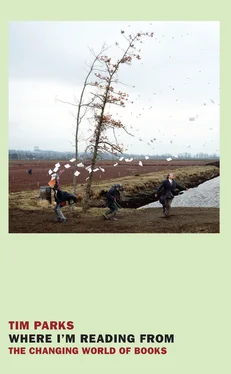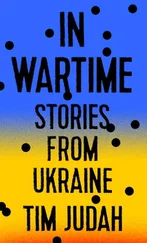I suspect not. If we asked the question of, for example, a Buddhist priest, he or she would probably tell us that it is precisely this illusion of selfhood that makes so many in the West unhappy. We are in thrall to the narrative of selves that do not really exist, a fabrication in which most novel-writing connives. Schopenhauer would have agreed. He spoke of people “deluded into an absolutely false view of life by reading novels,” something that “generally has the most harmful effect on their whole lives.” Like the Buddhist priest, he would have preferred silence or the school of experience, or the kind of myth or fable that did not invite excited identification with an author alter ego.
Personally, I’m too enmired in narrative and self-narrative to bail out now. I love an engaging novel, I love a complex novel; but I am quite sure I don’t need it.
“SIR—” REMARKED SAMUEL JOHNSON with droll incredulity to someone too eager to know whether he had finished a certain book—“Sir, do you read books through?” Well, do we? Right through to the end? And if we do, are we the suckers Johnson supposed us to be?
Schopenhauer, who thought and wrote a great deal about reading, is on Johnson’s side. Life is “too short for bad books” and “a few pages” should be quite enough, he claims, for “a provisional estimate of an author’s productions.” After which it is perfectly okay to put an author back on the shelf if you’re not convinced.
But I’m not really interested in how we deal with bad books. It seems obvious that any serious reader will have learned long ago how much time to give a book before choosing to shut it. It’s only the young, still attached to that sense of achievement inculcated by anxious parents, who hang on doggedly when there is no enjoyment. “I’m a teenager,” remarks one sad contributor to a book review website:
I read this whole book [it would be unfair to say which] from first page to last hoping it would be as good as the reviews said. It wasn’t. I enjoy reading and finish nearly all the novels I start and it was my determination never to give up that made me finish this one, but I really wish I hadn’t.
One can only encourage a reader like this to learn not to attach self-esteem to the mere finishing of a book, if only because the more bad books you finish, the fewer good ones you’ll have time to start.
What about those good books, though? Because Johnson certainly wasn’t just referring to the bad when he tossed out that provocation. Do we need to finish them? Is a good book by definition one that we did finish? Or are there occasions when we might choose to leave off a book before the end, or even only halfway through, and nevertheless feel that it was good, even excellent, that we were glad we read what we read, but don’t feel the need to finish it? I ask the question because this is happening to me more and more often. Is it age, wisdom, senility? I start a book. I’m enjoying it thoroughly, and then the moment comes when I just know I’ve had enough. It’s not that I’ve stopped enjoying it. I’m not bored, I don’t even think it’s too long. I just have no desire to go on enjoying it. Can I say then that I’ve read it? Can I recommend it to others and speak of it as a fine book?
Kafka remarked that beyond a certain point, a writer might decide to finish his or her novel at any moment, with any sentence; it really was an arbitrary question, like where to cut a piece of string, and in fact both The Castle and America are left unfinished, while The Trial is tidied away with the indecent haste of someone who has decided enough is enough. The Italian novelist Carlo Emilio Gadda was the same; both his major works, That Awful Mess on the Via Merulana and Acquainted with Grief , are unfinished and both are considered classics despite the fact that they have complex plots that would seem to require endings that are not there.
Other writers deploy what I would call a catharsis of exhaustion: their books present themselves as rich and extremely taxing experiences that simply come to an end at some point where writer, reader, and indeed characters all feel they’ve had enough. The earliest example that comes to mind is D.H. Lawrence, but one thinks of Elfriede Jelinek, Thomas Bernhard, Samuel Beckett, and the wonderful Christina Stead. Beckett’s prose fiction gets shorter and shorter, denser and denser as he brings the point of exhaustion further and further forward.
All these writers it seems to me, by suggesting that beyond a certain point a book might end anywhere, legitimize the notion that the reader may choose for him or herself where to bow out (of Proust’s Recherche for example, or Mann’s Magic Mountain ) without detracting anything from the experience. One of the strangest responses I ever had to a novel of my own—my longest not surprisingly—came from a fellow author who wrote out of the blue to express his appreciation. Such letters of course are a massive boost to one’s vanity, and I was just about to stick this very welcome feather in my cap, when I reached the last lines of the message: he hadn’t read the last fifty pages, he said, because he’d reached a point where the novel seemed satisfactorily over.
Naturally I was disappointed, even a little angry. My leg had surely been pulled. Wasn’t this damning criticism, that I’d gone on fifty pages too long? Only later did I appreciate his candor. My book was fine, for him, even without the ending. It wasn’t too long, just that he was happy to stop where he did.
What, then, since clearly I’m talking about books with aesthetic pretensions, of the notion of the work of art as an organic whole—you haven’t seen its shape unless you’ve seen all of it? And, since again I have mainly referred to novelists, what of the question of plot? A novel that is plotted requires that we reach the end, because the solution to the tale will throw meaning back across the entire work. So the critics tell us. No doubt I’ve made this claim myself in some review or other.
But this is not really my experience as I read. There are some novels, and not just genre novels, where plot is indeed up front and very much the reason why one keeps turning the pages. We have to know what happens. These are rarely the most important books for me. Often one skims as heightened engagement with the plot reduces our attention to the writing as such; all the novel’s intelligence is in the story and the writing the merest vehicle.
Yet even in these novels where plot is the central pleasure on offer, the end rarely gratifies, and if we like the book and recommend it to others, it is rarely for the end. What matters is the conundrum of the plot, the forces put in play and the tensions between them. The Italians have a nice word here. They call plot trama , a word whose primary meaning is weft, woof, or weave. It is the pattern of the weave that we most savor in a plot—Hamlet’s dilemma, perhaps, or the awesome unsustainability of Dorothea’s marriage to Casaubon—not its solution. Indeed, the best we can hope from the end of a good plot is that it not ruin what came before. I would not mind a Hamlet that stopped before the carnival of carnage in the last scene, leaving us instead to mull over all the intriguing possibilities posed by the young prince’s return to Elsinore.
In this regard it’s worth noting that stories were not always obliged to have an end, or to keep the same ending. In The Marriage of Cadmus and Harmony , Roberto Calasso shows that one of the defining characteristics of a living mythology is that its many stories, so excitingly tangled together, always have at least two endings, often “opposites”—the hero dies, he doesn’t die, the lovers marry, they don’t marry. It was only when myth became history, as it were, that we began to feel there should be just one “proper” version, and set about forgetting the alternatives. With novels, the endings I’m least disappointed with are those that encourage the reader to believe that the story might very easily have taken a completely different turn.
Читать дальше












